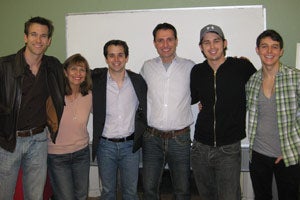Victims of changing demographics and plummeting popularity, long-running and iconic television soap operas – once stalwarts of daytime TV – are being cancelled by the networks: “As the World Turns” was axed this month after 54 years on the air, and “Guiding Light” was dropped in September, 72 years after its debut as a radio program. With the future of other soaps looking grim, a group of actors participated in a day-long training with HLS’s Negotiation and Mediation Clinic to learn negotiation skills for dealing with networks during tough economic times and a changing daytime TV industry.
“Actors never negotiate their own interests; we rely on agents and managers to do that,” said Kennedy. “It was so empowering to think of ourselves as negotiators and to learn skills in being effective in that art.”
About 20 actors—from soap operas such as “All My Children,” “One Life to Live,” and “As the World Turns,” as well as other actors from the Screen Actors Guild and the American Federation of Television and Radio Actors—attended the workshop. In addition to Kennedy, the group included Marie Masters, who has played the role of Dr. Susan Stewart on “As the World Turns” for more than 40 years and also worked as a dialogue writer for the program.
Masters praised the negotiation program. “I learned that negotiating is a compassionate process whereby everyone can—and indeed, should—win,” she said. It “rescued me from [seeing] negotiation as a primitive tool—I hit you on the head while you’re not looking and take your dead meat, kicking you while you’re down for good measure, and insuring you won’t chase after me and get the dead meat back—and replacing it with negotiation as the fine ‘art of letting the other side have your way’.” She called Bordone “a funny, engaging and inspiring teacher.”
The group spent the day discussing and learning techniques of basic negotiation. One exercise demonstrated that people in conflict often impute bad intentions to a negotiation counterpart based on the impact the other side’s behavior may have on them. For example, when a network makes decisions about production costs without consulting with the cast of a program, cast members may feel disregarded even though the network may have only been thinking about how to meet severe budget pressures and had no intention of disregarding their on-air talent.
“One of the things we focused on was the fact that, particularly in periods where resources are becoming more constrained, the natural instinct is to batten down the hatches and hunker down,” Bordone said. “But that’s exactly when you need improved communication. That’s when being able to work collaboratively and to trust each other becomes more important.”
Adam Mayfield, one of Kennedy’s costars on “All My Children,” said the workshop has broad application. “I not only learned how to better negotiate with integrity and honesty in my professional life, but in my personal life as well,” he said.
Bordone and Berkman presented the workshop at no cost to the actors, in part to expand into a new area for the young clinic, which was founded by Bordone in 2006. “Our clinic is always looking for opportunities to work in different industries and different sectors,” said Bordone. “Negotiations in the entertainment industry are complex and provide wonderful opportunities for our students to apply the lessons they learn in the classroom in a context that is dynamic, exciting, and of great interest to our students.”
